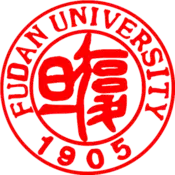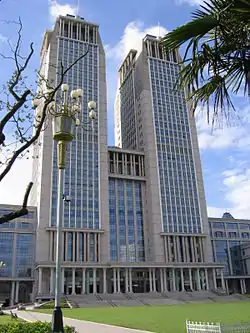Fudan University
Fudan University (simplified Chinese: 复旦大学; traditional Chinese: 復旦大學; pinyin: Fùdàn Dàxué) is a major public research university in Shanghai, China. It is widely considered one of the most prestigious and selective universities in China.[4] Founded in 1905, shortly before the end of China's imperial Qing dynasty, Fudan was the first university established independently by the Chinese people.[5][6] Fudan is a member of the elite C9 League and a Chinese Ministry of Education Class A Double First Class University.[7]
复旦大学 | |
 
| |
Former names | Fudan Public School (1905) Fudan College Private Fudan University (1917–1941) National Fudan University (1941–1949) |
|---|---|
| Motto | 博学而笃志,切问而近思[1] Scientia et studium, quaestīo et cogitatio (Latin) |
Motto in English | Rich in knowledge and tenacious of purposes, inquiring with earnestness and reflecting with self-practice[2] |
| Type | Public |
| Established | 1905 |
| Founder | Fr. Ma Xiangbo, S.J. |
| President | Xu Ningsheng |
| Party Secretary | Jiao Yang |
Academic staff | 2,700 |
Administrative staff | 5,800 |
| Students | 31,900 |
| Undergraduates | 14,100 |
| Postgraduates | 14,800 (including doctoral students) |
Other students | 3,000 (exchange students) |
| Location | 220 Handan Rd., Yangpu District , Shanghai , China |
| Campus | 604 acres Urban: Handan campus Fenglin campus Jiangwan campus Suburban: Zhangjiang campus |
| Affiliations | C9, Universitas 21, AEARU, APRU, BRICS Universities League, Council on Business & Society, Washington University in St. Louis McDonnell International Scholars Academy[3] |
| Website | www.fudan.edu.cn |
Fudan is renowned for its liberal atmosphere and rigorous academics. It is an important academic center for Chinese humanities, natural sciences, and medical studies. Fudan enjoys the reputation of The No.1 Academy of Jiangnan ("江南第一学府").[8] For the past hundred years, Fudan has made significant contributions to the development of the country, the rejuvenation of the nation, the well-being of the society, and the advance of the national education, science, medicine, and technology.[9] Fudan has cultivated a number of outstanding talents and many prominent figures for modern China. Notable Fudan alumni include Chen Yinke, Chen Wangdao, Chu Coching, Yan Fu, Yu Youren and "China's Kissinger" Wang Huning.
Fudan is a collegiate university with five colleges – Zhide (志德), Tengfei (腾飞), Keqing (克卿), Renzhong (任重), and Xide (希德). It is now composed of four campuses in Shanghai – Handan (邯郸), Fenglin (枫林), Zhangjiang (张江), and Jiangwan (江湾) – which share the same central administration. Fudan has 17 hospitals affiliated. In the 2020 QS Asian University Rankings, Fudan University is ranked 4th in China and 7th in Asia.[10]
History
Fudan University, formerly romanized as Fuh Tan, was founded as Fudan Public School in 1905, by Ma Xiangbo, SJ, who had resigned from Aurora University. The two Chinese characters Fu (复, means "again") and Dan (旦, means "morning", "light" ), meaning both "(heavenly light shines) day after day" and "Aurora Revived", were chosen by Ma on the recommendation of Yu Youren, from the Confucian Classic Shangshu Dazhuan (Chinese: 尚书大传): "Itinerant as the twilight, sun glows and moon luminesces" (Chinese: 日月光华,旦复旦兮). The university motto "Scientia et studium, quaestīo et cogitatio" comes from Analects Book 19.6 (Chinese: 博学而笃志,切问而近思), which means "rich in knowledge and tenacious of purposes, inquiring with earnestness and reflecting with self-practice".
In 1911, during the Xinhai Revolution, the college was occupied as headquarters of the Guangfu Army and closed down for almost one year.
In 1917, Fudan Public School became a private university named the Private Fudan University, and also had a middle school and university-preparatory school. In 1929, Fudan reorganized its departments, expanding to include departments of journalism, municipals, law, and education.
After the Japanese invasion of China in 1937, Fudan moved with the Kuomintang government to the inland city of Chongqing, the wartime Chinese capital. On 25 December 1941, the First Meeting of Fifth Conference of the Highest Executive Authority of the National Government of the Republic of China voted to change Fudan University (Chongqing) to a public university with Wu Nanxuan as its president. Fudan University then became National Fudan University. After the end of World War II, it moved back to Shanghai.
After the founding of the People's Republic of China in 1949, Fudan lost its "National" appellation and became Fudan University to reflect the fact that all universities under the new socialist state would be public. Fudan was the first university to be reorganized by the new government in 1952 and modeled on Soviet education. The original departments were changed, with arts and sciences departments from at least ten other universities in eastern China being added. Parts of Aurora University merged into Fudan in 1952.
In the late 1970s, after the Cultural Revolution, the university was converted to a modern, comprehensive university.
Fudan University and Shanghai Medical University merged on 27 April 2000.
In December 2019, Fudan University changed its charter, removing the phrase "academic independence and freedom of thought" (學術獨立和思想自由) and including a "pledge to follow the Communist party's leadership" (學校堅持中國共產黨的領導), leading to protests among the students.[11][12] It also said that Fudan University had to “equip its teachers and employees” with “Xi Jinping Thought”, leading to concerns about the diminishing academic freedom of Fudan.[13][14]
Institutions


Organizations
Fudan University comprises 17 full-time schools, 69 departments, 73 bachelor's degree programs, 22 disciplines and 134 sub-disciplines authorized to confer PhD degrees, 201 master's degree programs, 6 professional degree programs, 7 key social science research centers of Ministry of Education P.R.C, 9 national basic science research and training institutes and 25 post-doctoral research stations. It has 40 national key disciplines granted by the Ministry of Education, nationally third. At present, it has 77 research institutes, 112 cross-disciplinary research institutes, and 5 national key laboratories. See a list of schools and departments at Fudan.
Fudan University enrolls over 45,000, including full-time students and students in continuing education and online education. Additionally, there are nearly 1,760 international students, ranking second nationally.
Fudan University has a high-level research faculty of over 2,600 full-time teachers and researchers, including 1,350 professors and associate professors, 47 academicians of the Chinese Academy of Sciences and the Chinese Academy of Engineering, nearly 660 doctoral supervisors, 26 special professors and 2 lecture professors of "Cheungkong Scholars Program", 3 distinguished professors and 10 special professors of Fudan University, 6 principal scientists of Project 973 and 25 "Young Experts with Prominent Contributions to the Country".
Fudan University has 17 affiliated hospitals, such as Zhongshan Hospital and Huashan Hospital, integrating medical service, medicine education, and research.
Fudan University has an "International Student's Dormitory", a building reserved as living quarters for any students from countries other than China studying either degree or non-degree programs. Notable alumni include Jennifer Chu and Audrey Lamsam of Arcadia, California, who started a nonprofit organization called "Food4Me" in 2012. This organization first stemmed from their studies as non-degree Chinese students at the university.
Fudan is a member of Universitas 21, an international consortium of research-driven universities.
The Guanghua Twin Towers (Chinese: 光华楼) at the center of the Handan campus reach 140.5 meters, reportedly the highest buildings ever constructed in a university campus in Asia, and 2nd around the world.
The High School Affiliated to Fudan University, located on the Handan campus, is one of the most prestigious high schools all over China mainland.
Library
Fudan University Library was formally established in 1922, previously known as the Reading Room of Wu Wu (1918). Today it comprises the Liberal Arts Library, the Science Library and the Medical Library, with a total floor of 29,000 square meters.
By the end of 2004, the Library's collection composed of more than 4.4588 million copies and articles, including books, journals, bound volumes of newspapers, and audio-visual recordings. Of all these 400,000 are thread-bound books of Chinese classics (including 7,000 rare copies), 100,000 are books published during the reign of the Republic of China, and 1.392 million are foreign books. Additionally, there are 32,000 Chinese and foreign journals and periodicals. Every year 100,000 new books will be added to enlarge the collection. The library subscribes to around 7,000 printed journals.
The library has access to 24,000 full-text e-journals and over 150 CD and online databases. It has eight open stacks, two general reading rooms and 19 reading rooms with specialized functions, totaling 2,400 seats. The library is open for 112 hours weekly and serves more than 7,000 visiting readers daily.
The Fudan University Library is divided into the China Academic Humanities and Social Sciences Library (CAHSL), the National Foreign Textbook Center for East China (sponsored by the Ministry of Education), the Documentation and Information Center for Liberal Arts, and the Central Stacks for Foreign Books of Liberal Arts. Additionally, the library has the Shanghai Electronic Documents Searching Center for Graduates, the CD Searching Center shared by the universities in Northeast Shanghai, and the General Search Station for Updated Science and Technology Information Authorized by the Ministry of Education, the Search Station for Updated Science and Technology Information Authorized by the Shanghai Science and Technology Committee. The library edits and publishes two journals: China Index and Information Services of the Higher Education Institutions in Shanghai.
The library's integrated computer management system has been upgraded several times. In addition to general services, the Library provides services of international online information retrieval, various types of e-resources searching, interlibrary loans, document delivery service, online consultation, updated information search, user training, tape duplication, multimedia viewing, document duplication, and binding, etc. The courses of literature and information retrieval are designed for Library users of different levels.
Reputation and rankings
| University rankings | |
|---|---|
| Global – Overall | |
| ARWU World[15] | 100 (2020) |
| QS World[16] | 34 (2021) |
| QS Employability[17] | 29 (2020) |
| THE World[18] | 70 (2021) |
| THE Reputation[19] | 51-60 (2020) |
| Regional – Overall | |
| QS Asia[20] | 6 (2021) |
| QS BRICS[21] | 3 (2019) |
| THE Emerging Economies[22] | 7 (2020) |
| National – Overall | |
| BCUR National[23] | 5 (2019) |
The QS World University Rankings 2021 ranked Fudan at 34th in its global rankings while it was 7th in the independent regional QS Asian University Rankings (2021)[24] and 3rd in QS BRICS University Rankings (2019),[25] respectively. Further, ARWU (2020) put it at a position among 100th globally.[26] It is among the top 100 universities in the world and top five in mainland China in all of the above league tables.
Admissions
Popularity and selectivity
Fudan University's undergraduate program is extremely selective. Fudan is one of the five universities (together with Tsinghua University, Peking University, Zhejiang University and Shanghai Jiao Tong University) in China whose undergraduate programs are the hardest for students to get in: less than 0.2% of National College Entrance Examination ("Gaokao") takers can make it (As a comparison, the five most selective Ivy League schools in 2012 let in three times the percentage (0.6%) of SAT-takers.).[27] Fudan has been placed consistently among the three most selective universities (with Tsinghua University and Peking University) in China for the last twenty years.[28][29][30][31]
Undergraduate program

Fudan has reconstructed its course system to suit education goals. A course scheme of general education, specialized education and basic education in arts and sciences has been implemented. Encompassing a complete and comprehensive range of disciplines, the courses of general education enable students to receive education in diverse fields. All of the 70-plus undergraduate majors of Fudan have been put into seven general categories so that students can benefit on a broader scale from the systematic discipline training. According to the Education Scheme for Arts and Sciences, course modules are determined by discipline systems and course suits, and credits by course modules. In this sense, Fudan provides students with more options for their college studies. In contrast with the traditional syllabus, the new module has appropriately decreased the gross credits and class hours. Along with minor programs and extracurricular academic activities, it contributes greatly to the intellectual development of undergraduate students, exposing them to a wider range of knowledge.
Graduate program
The Graduate School of Fudan University was established on 6 November 1984 and the Graduate School of Shanghai Medical University on 25 January 1985. Both were among the first 22 graduate schools after China's universities officially resumed enrolling graduate students. With the merger of Shanghai Medical University and Fudan University in April 2000, the two graduate schools were joined to be a new Graduate School of Fudan University. Therefore, a comprehensive graduate education structure is formed with disciplines in humanities, law, sciences, engineering, medicine, and management.
International students
Starting from the 1950s, Fudan has enrolled international students – one of the first few institutions in China to do so. Since then, Fudan has accepted and trained over 10,000 foreign students from 100 countries and regions worldwide. At the end of 2006, there were 2,812 international students studying at Fudan University, ranked number 2 in the nation. Half of them were actively pursuing degrees, the rest were general visiting scholars. In addition, Fudan enrolls over 1700 short-term students each year.
The international student programs consist of degree programs and non-degree programs.[32] The university has also established a Bachelor of Arts program called the "Chinese language for international students" and there have been seven groups of graduates. Besides all levels of Chinese language teaching, the university has opened courses such as Chinese literature, Chinese history, Chinese economy, Chinese philosophy, and Chinese law for interested international students. These courses will introduce students to basic knowledge of Chinese social economy, history, and culture, according to their different requirements. In addition, several graduate programs are offered in English. For instance Master of Business Administration, Master of Public Health, as well as other programs offered in conjunction with partner universities abroad. The university's programs in medicine leading to the Bachelor of Medicine, Bachelor of Surgery (MBBS) degree are also available to international students.
The International Students Office is responsible for the management of all international students at Fudan University.
Campus

Fudan has established a campus structure called "one-body-two-wings", where the body is Handan (邯鄲) campus and Jiangwan (江灣) campus, which are only 2 miles (3.2 km) apart, and the two wings are Fenglin (楓林) campus and Zhangjiang (張江) campus. All four campuses are in downtown Shanghai and share the same central administration.
Handan campus
Handan campus, the main campus of Fudan, is located in Yangpu District, Shanghai. It contains the majority of the schools and departments. Freshman undergraduates live on this campus. Handan campus consists of four sub-campuses, namely the headquarters campus, the south campus, the north campus, and the east campus.
Fenglin campus
Fudan University Shanghai Medical College, or Medical Center of Fudan University (former Shanghai Medical University) is at Fenglin campus, located in Xuhui District, Shanghai. In July 2014, the campus began a 2-year large-scale construction project. About 4000 students move out of the old campus for the construction and in July 2017 students came back to it.
Zhangjiang campus
Zhangjiang campus is located in Shanghai's Zhangjiang Hi-Tech Park, Pudong District. It comprises the School of Microelectronics, the School of Computer science and technology, the School of Software, and the School of Pharmacy.
Jiangwan campus
Only 2 miles (3.2 km) apart from Handan campus, Jiangwan campus is a new campus of Fudan University. The School of Law has moved to Jiangwan, and other schools will follow, including the School of Life Science, the College of Foreign Language and Literature, and School of Social Development and Public Policy.
Student associations
There are four categories of student associations: Academic Societies, Practical Societies, Artistic Societies, and Physical Culture Societies. See also Student Associations at Fudan.
Notable alumni
Since 1952, Fudan University has a total of 95 academicians alumni, second only to Peking University and Tsinghua University in China.[33] After the Cultural Revolution, Fudan has also educated more than 60 alumni being full professors in TOP15 American/British universities, which makes Fudan the second highest Chinese university in this criteria.[34]
Today, associations organized by Fudan's alumni can be found in the United States, Japan, Australia, Canada, Taiwan, Hong Kong, and mainland China. Educationally, academically and economically, Fudan alumni's strengthened ties with their alma mater are playing a significant role in the development of the University. The routine services of these alumni associations include: updating contact lists, holding conferences, conducting Sino-foreign cultural exchanges, and keeping contact with other alumni associations throughout the world.
Li Deng-hui, ex-president of Fudan instructed the students to unite, serve and sacrifice. A well-known 77-year-old architect from the Alumni Association in Taipei also said that strength lies in unity and that Fudan alumni are expected to serve as an example in the increasing mergers of higher learning schools in mainland China.
A worldwide gathering is held annually in order to promote the relations between the alumni all over the world.
Partnerships
Fudan University is a member of the Consortium of Academic Stewards for The Scholar Ship. The University is also a member of China Center Austria and partner of the Austrian Business School SMBS.
Fudan University is also a member of Universitas 21, which is an association of leading universities worldwide. Universitas 21 grants members of staff and students from the university many exchange chances and opportunities to research abroad.
To seek more support from its alumni in the US and cement its collaboration with Yale University, Fudan University launched the Fudan University Education Development Foundation[35] in New York in February 2008. It was the first time a Chinese university had launched such an initiative in the US.
In 1995, Fudan established the Nordic Centre in Shanghai, a joint platform for research and education with 14 universities from Denmark, Finland, Norway, and Sweden. By 2012, the Nordic Centre Fudan has 27 member institutions in 5 Nordic countries.[36]
In 1996, Fudan School of Management started a joint Master of Management (later MBA) program with BI Norwegian Business School. The program, inaugurated by then Norwegian Prime Minister Gro Harlem Brundtland, is the longest continually operating international business school partnership in China.
In 2002, a joint venture was created between the Olin Business School (Washington University in St. Louis) and the School of Management at Fudan University. At the time, it was one of the first U.S.-Sino joint MBA programs in China. Eight years later, according to The Financial Times' 2010 rankings, the Washington University-Fudan University EMBA Program[37] was ranked as one of the top 20 international executive MBA programs worldwide. Also, for the fifth consecutive year, it was hailed as the best program in mainland China.[38]
In 2011, Fudan became part of the Tyndall Centre network, a research network centered on climate science and climate policy research. Fudan Tyndall Centre is funded with a 15-year commitment by the Chinese central government and the Shanghai City government. The UK launch of the Fudan Tyndall Centre alliance took place in Norwich in May 2011 when Professor Academician Yuliang Yang was awarded an Honorary Degree by the University of East Anglia[39]
In Germany, the Fudan University cooperates with the Goethe-University in Frankfurt/Main. Both cities are linked by a long-lasting partnership agreement.[40] The university also established partnerships with the Freie Universität Berlin, the University of Cologne, the University of Tübingen and the University of Konstanz.
Exchange programs
Fudan University has established exchange relationships with more than 200 universities and research institutions in about 30 countries and regions,[41][42] including Oklahoma State University, Beloit College, Washington University in St. Louis, Harvard University, Yale University, Trinity College (Connecticut), Union College (New York), Tulane University, Columbia University, University of California, Berkeley, University of Rochester, George Washington University, Georgetown University, University of California, Los Angeles, University of California Santa Barbara, University of California, San Diego, University of California, Irvine, University of Toronto, Bocconi University, Queen's University, University of Sydney, LUISS Guido Carli University, University of Adelaide, Rhodes University, K.U. Leuven, Ecole Pratique des Hautes Etudes Commerciales, Tokyo University, National University of Singapore, University of Salzburg, Austria, the University of Manchester, Durham University Business School, the London School of Economics, King's College London, University of Mannheim, Germany, ESSEC Business School, University of Paris 1 Pantheon-Sorbonne, Sciences Po Paris and Sciences Po Lille, IE Business School, and the 16 campuses of the University of North Carolina. For more information, see also Fudan – Incoming exchange students.[43]
See also
- Auto-ID Labs
- S3 Asia MBA – Joint MBA program by Fudan University, Korea University and NUS Business School
- US-China University presidents Roundtable
References
- 复旦标志. Fudan University. Retrieved 6 October 2017.
- "University Name, Motto and Logo". Fudan University. Retrieved 25 June 2014.
- https://global.wustl.edu/mcdonnell-academy/. Missing or empty
|title=(help) - "Best universities in China 2018". Times Higher Education. 6 September 2017.
- "胡锦涛致复旦大学建校100周年的贺信".
- 教育部 财政部 国家发展改革委 关于公布世界一流大学和一流学科建设高校及建设 学科名单的通知 (Notice from the Ministry of Education and other national governmental departments announcing the list of double first-class universities and disciplines).
- "上海地方志:江南第一学府——复旦大学".
- "吴邦国在庆祝复旦大学建校百年大会上的讲话".
- https://www.topuniversities.com/university-rankings/asian-university-rankings/2020. Missing or empty
|title=(help) - "Students protest at Shanghai's Fudan University". Asia Times. 19 December 2019. Retrieved 19 December 2019.
A video circulating this week showed students at Shanghai’s Fudan University singing the school song – which extols "academic independence and freedom of thought" – in an apparent protest.{...}Besides removing "freedom of thought", the ministry adds to the charter "arming the minds of teachers and students with Xi Jinping’s new era of socialist ideology with Chinese characteristics". It also obliges faculty and students to adhere to "core socialist values" and build a "harmonious" campus environment – a code phrase for the elimination of anti-government sentiment.
- 復旦大學章程刪除思想自由 學生唱校歌抗議要求學術獨立[影]. Central News Agency (in Chinese). 18 December 2019. Retrieved 19 December 2019.
- "Freedom curbs raise academic collaboration uncertainty". University World News. Retrieved 30 June 2020.
- "Chinese Universities Are Enshrining Communist Party Control In Their Charters". NPR.org. Retrieved 30 June 2020.
- "ARWU World University Rankings 2020 – Academic Ranking of World Universities 2020 – Top 500 universities – Shanghai Ranking – 2020". www.shanghairanking.com. Retrieved 17 September 2020.
- "QS World University Rankings 2021". 1 June 2020. Retrieved 18 June 2020.
- "QS Graduate Employability Rankings 2020". Top Universities. 27 November 2020.
- "World University Rankings". 17 September 2020. Retrieved 17 September 2020.
- "THE Reputation World University Rankings 2020". Retrieved 27 November 2020.
- "QS University Rankings: Asia 2021". Retrieved 27 November 2020.
- QS University Rankings 2019
- "THE Emerging University Rankings 2020". Retrieved 27 November 2020.
- Best Chinese Universities Ranking, Overall Ranking – 2019
- "QS University Rankings 2021". Top Universities. 17 June 2020. Retrieved 18 June 2020.
- "QS University Rankings: BRICS 2019". Top Universities. 12 July 2019. Retrieved 18 June 2020.
- "ARWU World University Rankings 2020 | Academic Ranking of World Universities 2020 | Top 500 universities | Shanghai Ranking – 2020". www.shanghairanking.com.
- Writers, Staff (13 August 2012). "15 Facts About China's Grueling College Entrance Exam -". Retrieved 16 January 2017.
- "2019年复旦生源质量全国前三".
- "2010年复旦招生生源质量全国排名第三".
- "【历史数据】2001年985和顶尖211录取分数线排行".
- "【历史数据】2000年985和顶尖211录取分数线排行".
- "Fudan – International students office". Retrieved 11 July 2018.
- Fudan University Education Development Foundation Archived 5 January 2009 at the Wayback Machine
- "Nordic Centre – Home". Retrieved 3 July 2015.
- 复旦大学-华盛顿大学EMBA项目- Washington University in St.Louis & Fudan University – 复旦大学-华盛顿大学EMBA项目. Retrieved 3 July 2015.
- "Business school rankings from the Financial Times". Retrieved 3 July 2015.
- "Press Release: Fudan hub of the Tyndall Centre for Climate Change Research to address China's sustainability challenges". Archived from the original on 5 July 2015. Retrieved 3 July 2015.
- "Goethe-Universität – Partneruniversitäten". Retrieved 3 July 2015.
- 您要查看的页面不存在. Retrieved 3 July 2015.
- Fudan – University Level Exchange Agreement Archived 2 May 2009 at the Wayback Machine
- "Exchange Partners | Elliott School of International Affairs | The George Washington University". elliott.gwu.edu. Retrieved 24 September 2018.
External links
| Wikimedia Commons has media related to Fudan_University. |

